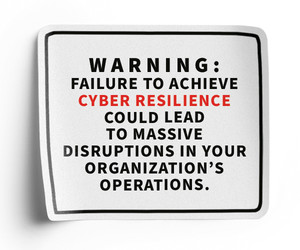“Cyberthreats today are more complex — and damaging — than ever,” writes Gary McIntyre, managing director of cyber defense at CDW. That’s why establishing a cyber resilience strategy in advance of attacks can lessen the impact of any breach. The more prepared an organization is “during and after an incident,” McIntyre explains, the more likely that it can avoid downtime that threatens the bottom line.
Understanding the connection between cyber resilience and business continuity helps IT leaders enact smarter security plans. Not convinced? Here are three ways cyber resilience supports business continuity.
Click the banner below to learn why cyber resilience improves threat defenses.
1. Enhanced Preparedness for Cyberthreats
Cyberattacks are now so common that 36 percent of businesses have experienced at least one data breach of more than $1 million in 2024, according to a PwC report. To achieve cyber resilience, IT leaders must prepare for cyberattacks on a continuous basis. The strategy is to stay ready and proactive rather than slip back into a reactionary stance.
To get to this secure spot, IT leaders can run comprehensive risk assessments, develop robust incident response plans, make extensive copies and backups of their data, and educate their teams with security trainings. It also requires that teams stay up to date with changing regulations in the threat landscape.
EXPLORE: Four ways businesses can be cyber resilient this year.
“Cyber resilience is gaining traction in the industry. It’s arguably your ace in the hole,” says Rubrik CISO Michael Mestrovich. “It’s like your break-glass-in-case-of-emergency hammer. It’s having a copy of your critical data but also the systems that you need to operate as a business — making sure those things are protected in a backup.”
With a copy in hand, businesses can reconstitute workflows faster. “I don't have to worry about business recovery operations, because I know that my data is in a safe place. Cyber resilience allows me focus on the matter at hand without having to fight a two-front war at the same time.”
2. Reduced Financial Impact of Cyber Incidents
The more cyberattacks that occur, the greater the ransom a business might have to pay. The Sophos State of Ransomware 2024 report reveals that 56 percent of organizations have made ransom payments to retrieve data, with the median payment $2 million. Yet these payments are only one common factor contributing to data breach costs.
Even without ransom payments, data recovery legal fees and potential fines for regulatory noncompliance can cost organizations plenty. So can system downtime. If a retailer’s website is down for a week, how much revenue is it missing out on each day? And how many customers will never return because the site was down too long?
Proper cyber resilience reduces the likelihood of these events happening. Cyber resilience helps fortify incident response plans to ensure a swift return to business as normal in the aftermath of a breach. This includes ensuring regular backups of critical data and investing in advanced protective measures such as threat modeling, penetration tests and vulnerability assessments to maintain a strong security posture.
56%
The percentage of organizations who have made ransom payments to recover their data
Source: Sophos, The State of Ransomware 2024, April 2024
3. Safeguarding Reputation and Customer Trust
It takes far longer to build a credible business reputation than it does to lose it. That’s true now more than ever, as organizations’ reputations are closely linked to their ability to protect customer data and service customers without interruptions. Two in 3 U.S. consumers reportedly say they won’t trust a company when a data breach puts their personal data at risk, and 3 in 4 will readily sever ties with a brand in the aftermath of any cybersecurity incident.
UP NEXT: Read the 2024 CDW Cybersecurity Research Report.
This loss in consumer confidence has a detrimental impact on revenue. And regaining this confidence often takes much longer than the immediate impacts of a data breach.
Cyber resilience strategies help IT leaders protect their organizations’ reputations by maintaining service even under adverse conditions and they also build trust between businesses and consumers.
“Your organization needs to be prepared with specialized and focused cyber recovery strategies,” writes McIntyre. “Not just to restore systems and data but to restore trust in your environment as well.”












